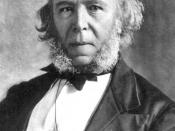All over the world, disparities between rich and poor, even in the wealthiest of nations are rising sharply. Fewer people are becoming increasingly "successful" and wealthy while disproportionately larger populations are becoming even poorer. There are many issues involved when looking at global poverty and inequality, it is not simply enough (or correct) to say that the poor are poor due to their own efforts and or lack thereof (or their government's) bad governance and management. In fact, you could quite easily conclude that the poor are poor because the rich are rich and have the power to enforce unequal trade agreements that favor their interests more than the poorer populations. Three perspectives that are often used when seeking causes for why people become poor are: The flawed perspective, restricted opportunity perspective and the structural perspective.
Perhaps the most common explanation of poverty focuses on what has been called the "flawed character" view of poverty (flawed perspective).
The flawed perspective is a microscopic perspective. According to this point of view, the causes of poverty are found in the shortcomings of the poor themselves. It uses the character traits of the poor to explain their predicament (blaming the victim). The full explanation relies on internal factors of the individual. "Causes of poverty attributed to the flawed character of the poor, range from individual defects in motivation, attitudes, aspiration, etc. It makes the assumptions that there is abundance of opportunities available, anyone can advance by education, those that remain poor didn't make the required effort and that the individual is in full control of their economic situation."
The foundation of the flawed perspective involves what social scientists call "Human Capital." Human Capital is the investment we make in ourselves. According to the human capital explanation, poverty persists because the poor...


